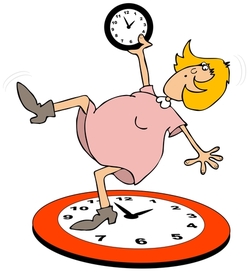My phone is ringing off the hook this week with panicked parents, who are concerned about the time change. They want to know what to do to ensure that their child's sleep stays intact after investing so much time and energy on effective sleep training. As you can imagine, these now sleeping parents are horrified by the idea that their great sleeper might possibly regress. I can't blame them for fearing this possibility!
Daylight savings time (DST) should not mean a complete shift in your child's sleep routine. Nor does it mean that suddenly your child will become a terrible sleeper.
During daylight savings time, we move the clock forward by one hour in the spring and back one hour in the fall, hence the expression "Spring Forward and Fall Back." Whether we are moving the clock forward or backward, children and adults may experience some sleep interruption as their bodies adjust to the time change. From my experience, children's sleep is not impacted as much as parents may think unless their children are already struggling with sleep. If your child is already a great sleeper, the time change should not affect them much. They may be slightly tired for a few days but that's all. It can take from one day to a week for our bodies to adjust to the time change and there is no way to avoid this.
I do not believe in putting parents through the stress of a week or two of shifting sleep routines in anticipation of something that will most likely not impact their child's sleep indefinitely. Also, there is no need to do anything elaborate in anticipation of DST, because most of the time children adjust so quickly after the change. Our children pick up on our emotions. If you are stressed about the time change, it could affect their ability to sleep.
I have found that when my clients implement the following three strategies their children adjust to the time change more readily.
1. Sleep Schedule
Keeping your child on their sleep schedule is key, especially over the DST weekend. I recommend not filling up your weekend with activities the day prior to and the day of DST. If at all possible, it's best to keep your children on their regular sleep schedule and in their home sleeping environment even at nap time. Sleep on the go will make their adjustment to the time change harder. Remember, sleep on the go does not allow your child to get REM sleep, which is what they need for development and mental growth.
On that Sunday morning, be sure to base their sleep schedule on the new time. Getting them on track on the new time will help your little one's body adjust more quickly to the time change.
2. Sleep Routine
Follow through with your child's sleep routine so they are receiving the same sleep cues. With children, it's all about consistency. Take them into their home sleep environment, pull down the shades, read them a book, sing a song, turn on a consistent white noise machine, love them up with hugs and kisses and then turn the lights off.
3. Set Your Clocks
On Saturday (November 1st), before you head to bed set all of your clocks around your house an hour back so that when you wake up in the morning your clocks already reflect the correct time.
If you implement these strategies, your child is likely to adjust within just a few days of the time change. Mark your calendar, DST is taking place on Sunday, November 2, 2014.
Image credit: Shutter Stock
For more sleep tips, visit The Baby Sleep Whisperer
